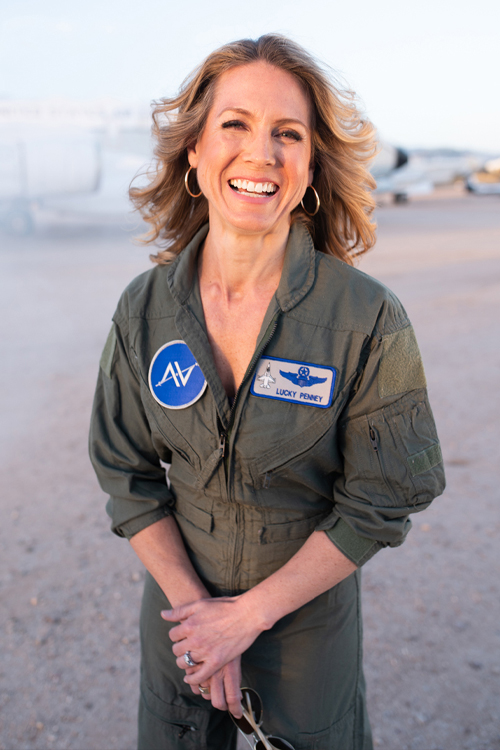Heather "Lucky" Penney
Former USAF Lieutenant, Mitchell Institute for Aerospace Studies Defense Policy Expert

CMG Speaks presents Heather "Lucky" Penney
Heather "Lucky" Penney
Former USAF Lieutenant, Mitchell Institute for Aerospace Studies Defense Policy Expert
Social Media
About Heather "Lucky" Penney
Most widely recognized for her service on September 11, Heather “Lucky” Penney was part of the first wave of women who went directly into fighters from pilot training. The first and only woman in the 121st Fighter Squadron, Heather deployed to Operation Iraqi Freedom for initial combat operations as a night-time SCUD Hunter in the western deserts of Iraq, also supporting Special Operations Forces. She flew the F-16 for ten years before having to make the difficult decision to leave fighter aviation as a single mother. She then flew the special airlift mission and retired out of the Pentagon. For over ten years, Heather was a Director of various Air Force programs for Lockheed Martin, specializing in capture management, government relations, and strategic business development. She now is a Senior Resident Fellow for the Mitchell Institute for Aerospace Studies at the Air Force Association, where she is an expert on defense policy issues related to airpower and the Air Force.
Speakers Reel
Speaking Topics
Heather “Lucky” Penney is a dynamic speaker who will deeply move your audience as she shares her experience on 9/11. Her delivery is resonant, respectful, and uplifting. As she honors the service and heroism of all who served and gave on that fateful day, her reflections inspire audiences and give them the tools to cultivate their own inner hero. “They were just ordinary, everyday Americans. They were just like you and me. Which means, we can be just like them. But why wait for a national crisis to bring that hero out? Don’t we need everyday heroes – every day?” Lucky offers the tools of practicing bravery, courage, and belong as a means to cultivate our own inner hero. Delivered with powerful stories, she shares that these qualities are something that we can choose to practice – and that in doing so, we will strengthen our own inner hero. “Never forget,” she urges, “but more important, always remember. That inside each and every one of us is an ordinary, everyday hero. That is the real legacy of 9/11. All we have to do is choose.”
Heather “Lucky” Penney humbly recounts her experience on 9/11, delivering a powerful reflection of that fateful morning. Your audience will feel the urgency and emotion of the Fighter Squadron as officers desperately worked together with one mission focus: Get jets airborne to protect the Capitol. In this moment of crisis, what mattered was clear. But how can leaders find clarity outside of crisis when addressing group culture may feel like a minefield? Leaders must align their organizational culture with their mission. This means establishing shared norms, values, behaviors, and codes that are directly tied to mission execution. High-performing teams rely on culture to establish trust, build esprit de corps, and enforce performance standards. Lucky was the first and only woman in her fighter squadron, and the only female combat pilot in her Wing during the initial hostilities of Operational Iraqi Freedom. “The other squadron took a firm stance against women in combat, bluntly stating that they would not fly with any women.” Lucky shares how dysfunctional culture can degrade mission performance, and how “a mission-focused culture enabled us to reach a higher level of performance, and at the same time be more inclusive and diverse – because what matters is mission, not what color, gender, sexuality, or political party you are. Mission is the common purpose that helps us find the common in each other.” This lens of mission-purpose enables leaders to go beyond core values to directly map culture to their desired outcomes.
